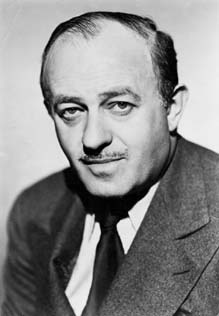Who won the Academy Award for Best Screenplay at the first Oscars?
Ben Hecht. 1929. The movie was Underworld. Considered one of the earliest, if not the earliest gangster movie ever made, you’d think that would be enough of an achievement for a lifetime. But this is Ben Hecht, and he was just warming up. Check out his bio:
“Ben Hecht, one of Hollywood’s and Broadway’s greatest writers, won an Oscar for best original story for Underworld (1927) at the first Academy Awards in 1929 and had a hand in the writing of many classic films. He was nominated five more times for the best writing Oscar, winning (along with writing partner and friend Charles MacArthur, with whom he wrote the classic play “The Front Page”) for The Scoundrel (1935) (the other nominations were for Viva Villa! (1934) in 1935, Wuthering Heights (1939) (shared with MacArthur), Angels Over Broadway (1940) and Notorious (1946), the latter two for best original screenplay). Hecht wrote fast and wrote well, and he was called upon by many producers as a highly paid script doctor. He was paid $10,000 by producer David O. Selznick for a fast doctoring of the Gone with the Wind (1939) script, for which he received no credit and for which Sidney Howard won an Oscar, beating out Hecht and MacArthur’s Wuthering Heights (1939) script.
Born on February 28, 1894, Hecht made his name as a Chicago newspaperman during the heady days of cutthroat competition among newspapers and journalists. As a reporter for the Chicago Daily News, he wrote the column “1001 Afternoons in Chicago” and broke the “Ragged Stranger Murder Case” story, which led to the conviction and execution of Army war hero Carl Wanderer for the murder of his pregnant wife in 1921. The newspaper business, which he and MacArthur famously parodied in “The Front Page”, was a good training ground for a screenwriter, as he had to write vivid prose and had to write quickly.
While in New York in 1926 he received a telegram from friend Herman J. Mankiewicz, who had recently arrived in Hollywood. The telegram read: “Millions are to be grabbed out here and your only competition is idiots. Don’t let this get around.” Hecht moved to Hollywood, winding up at Paramount, working uncredited on the script for Lewis Milestone‘s adaptation of Ring Lardner‘s story The New Klondike (1926), starring silent superstar Thomas Meighan. However, it was his script for Josef von Sternberg‘s seminal gangster picture Underworld (1927) that got him noticed. From then until the 1960s, he was arguably the most famous, if not the highest paid, screenwriter of his time.”–IMDB.
I first learned of Ben Hecht when I adapted his “1,001 Afternoons In Chicago” for the stage. These were columns he wrote for the Chicago Daily News about life in Chicago circa 1921. Every day people and events– what’s now called the human interest story– came out in these columns. Voices of the long since departed came alive, like this one, from a flapper in a jazz club in 1922:
SUZIE: So, you didn’t call me. I thought you and I was cookies. Well, that’s the way it is with Jakes. But there’s enough to go around, you can bet. Say, boy! I met the classiest Jake the other evenin’ the front of the Hopper. Did he have class, boy! You know there are some of these fancy Jakes who look like they were the class. But are they? Ask me. Nix. And don’t I give ‘em the berries quick. I don’t let any Jake get moldy on me. Soon as I see they’re heading for a dumb time I say ‘razzberry!’ and off your little sugar toddles!
SHERWOOD ANDERSON: You think I’m moldy?
SUZIE: Nah. There’s so Jakes tip over the oil can right from the start. You never forget them. Nobody could forget you, handsome. Never no more, never. How’s about that hootch, huh?! The stuff’s gettin’ rottener and rottener, doncha think? Come on, swallow. Here’s how! Oh, ain’t we got fun!
With 162 IMDB writing credits, I guarantee you’ve seen one of his movies. Everyone, for instance, knows the 1983 Al Pacino movie Scarface. But how about the original Scarface, with Paul Muni, back in 1929? Tell me this trailer doesn’t look good, even today…
As the bio above tells us, in what is widely acknowledged as one of the greatest years in filmmaking history, 1939, Hecht had TWO scripts up for consideration in the Best Picture category! His uncredited pass on Gone With The Wind beat out his credited Wuthering Heights script. The dude wrote Scarface AND Wuthering Heights! Oh, Heathcliff!
Looking over a screenwriting career that spans forty years (1927-1970), you’ll see this Chicago guy also worked with Hitchcock…a lot! Lifeboat and Rope (uncredited), Spellbound and Notorious (screenplay, Academy Award nominated). 4 with Hitchcock!
And this giant–who not one of my Millennials at Columbia College film school would know–was nominated for six Oscars, winning two. Am I crazy? Who else can say that? OK OK, Billy Wilder (16 nominations) and Woody Allen (12) have him beat, but still!
Of course the one he’s likely most remembered for is His Girl Friday. His days as a Chicago reporter trained Hecht’s ear for the dialogue he captured via his play The Front Page. Adapting it for film, “Devil-may-care” Cary Grant and “ravishing” Rosiland Russell had a repartee that was unrivaled in its day, the pacing of it setting the tone for 1940’s screwball comedy and echoed Nick and Nora Charles in the The Thin Man series. Howard Hawks, the director, made the lead character, Hildy Johnson, a woman, a radical choice back in the day. The film made #19 on American Film Institutes 100 years…100 laughs and was selected for preservation in the United States Film Registry. Watch the full movie for free here.


